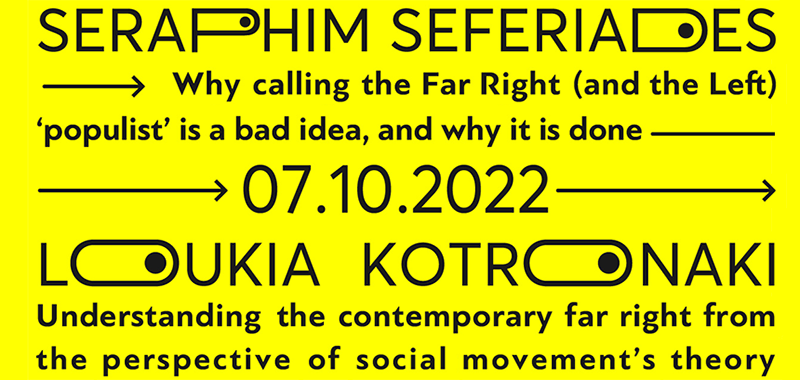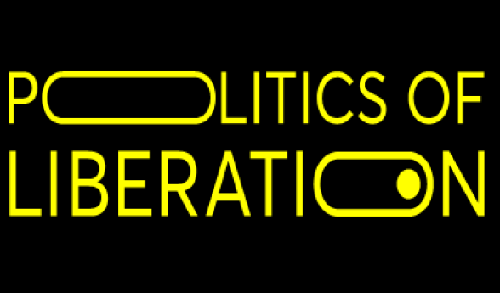You can watch the seminar live here.
Seraphim Seferiades “Why calling the Far Right (and the Left) ‘populist’ is a bad idea, and why it is done”
‘Concepts’, wrote Cambridge physicist George Thomson (1856-1940), ‘are ideas which receive names. They determine the questions one asks, and the answers one gets’. Scholars create words (conceptualize) to tell us what they actually ‘see’, to draw our attention to what they think is interesting and critical. But whether they realize it or not, this reflects their values, their normative and ideological beliefs. We always need to know ‒and, if necessary, unearth‒ these values, but what we judge them for is the performance of their concepts on the research field: whether they are able to pose and address questions that expand our cognitive horizons or ‒on the contrary‒ shrink them. Relying on classical methodological principles, this presentation addresses the prolonged cognitive dystopia observed in the so-called ‘populist studies’. I argue that whilst the dominant approaches function as first-rate transmission belts for the two basic value motives that sustain them (either the neoconservative defense of post-democracy or the projection of new reformism ‒aka ‘left populism’‒ the as the only possible answer to the ever-increasing systemic crisis), they result in stunningly poor social science.
Loukia Kotronaki “Understanding the contemporary far right from the perspective of social movement’s theory”
Not everything that moves deserves to be called a ‘social movement’. We hardly consider all extra-institutional action to be conducive ‒by definition‒ to social and political change, nor do we assume that all non-established political actors seek to promote a genuine alternative to the mainstream political agenda. And yet, this is precisely what we do when we set out to interpret, comprehend, and explicate the far-/alt-right in terms of social movement politics. Is there a common normative, communicative, or sociological glue binding the two phenomena together? Is it their common ‘power of numbers’, the social discontent they presumably air, or, perhaps, a new political ethos challenging dominant codes? Starting off by offering a theoretical overview of the historical trajectory of social movements, I will emphasize the defining properties of this particular form of contentious politics, whilst also highlighting their affinity with major political processes such as, most notably, democratization. I then turn to an assessment of the so-called ‘populist’ frame in the study of collective action. I argue that, instead of procuring more elaborate conceptual and analytical categories for interpreting recent political phenomena beyond the realm of routine politics, its ‒hardly innocuous‒ (re-)invention and proliferation has had the exact opposite effect: the normalization and mystification of the post-democratic condition.
Politics of Liberation is a bi-monthly seminar series which will be convened by Rosa Vasilaki and Giorgos Souvlis and will take place in the premises of the Rosa Luxemburg Stiftung (Kallidromiou 17, Athens, 1st floor) on Friday evenings from mid-September 2022 to the end of June 2023, from 7pm to 9pm.
The seminar will have the form of an open talk given by an invited speaker discussing aspects of the current conjuncture related to their research interests. Discussion with the participants will follow and materials related to the seminar will be available beforehand, so as to prepare ourselves for the discussion.
The seminar will take place in person, therefore it is paramount that you register before attending because of space limitations. Registration is on first-come first-served basis so make sure you register early. Registration opens 15 days beforehand. Make sure to make your booking asap! The seminar will also be broadcasted the digital platforms of the RLS office and the seminar’s social media and will also be available as a video on the website after completion.
Contributors for the 2022-2023 series are: Judith Butler, Dan-El Padilla Peralta, Edouard Louis , Geoff Eley , Stathis Kouvelakis, Brad Evans, Chantal Meza, Yannis Hamilakis, Sara Farris, Seraphim Seferiades, Loukia Kotronaki, Vassilis Lambropoulos , Olga Lafazani [Olga Laflaf], Paola Reveniotii , Panayota Gounari, Aristotle Kallis, Susan Robertson, Kanishka Goonewardena, Elisa Giustinianovich, Cedric De Leon, Athina Karatzogianni, Eugenia Siapera, Demetra Tzanaki , Volodymyr Ishchenko.
Check details and register here: https://politicsofliberation.gr/



